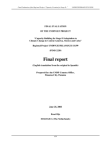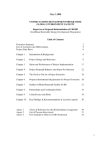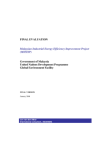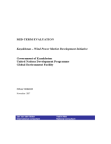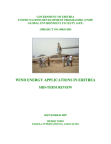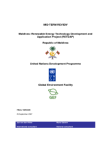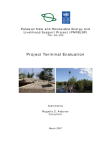The project was conceived as a UNDP/GEF enabling activity with the aim to support the countries in the region in their efforts to include vulnerability to climate change in their adaptation strategies.
UNDP, GEF
Capacity Building for Stage II Adaptation to Climate Change in Central America, Mexico and Cuba (Stage 2)
Caribbean Renewable Energy Programme (2008)
The justification for CREDP grew out of the Caribbean's high dependence (98%) on fossil fuels for its electricity and the consequent air, land and water pollution.
Removing Barriers to the Increased Use of Biomass as an Energy Source - Slovenia
The objective of the project was to reduce the CO2 emissions of Slovenia by removing barriers to the increased use of biomass as an energy source.
Introduction of Vehicle Electric Bus Technology and Hybrid-Electric Bus Technology in Egypt - Phase 1a
Urban air pollution is a major environmental problem in Egypt. Among the world's largest cities with over 16 million people, Cairo belongs to the 20 most polluted cities in the world.
Malaysian Industrial Energy Efficiency Improvement Project (2008)
the Government of Malaysia initiated the Malaysian Industrial Energy Efficiency Improvement Project (MIEEIP) in 1999 to improve the rational use of energy in the industrial sector.
Wind Power Market Development Initiative - Kazakhstan
In 1999, the Government of Kazakhstan developed the Energy Sector Development Program until 2030.
Wind Energy Applications in Eritrea (2007)
The project endeavors to introduce a new renewable energy mode new to Eritrea in launching pilot investments in both larger scale electricity generation into the national grids and in testing wind energy complementing diesel power or providing the sole electricity source in rural village communit
Renewable Energy Technology Development and Application Project (RETDAP)
Maldives has no conventional energy resources (e.g., oil and gas) that it can utilize to meet its energy needs. Basically, the country utilizes imported petroleum fuels to meet all of its energy needs.
Experimental validation of building
Compte tenu de l'importance du secteur des bâtiments dans le bilan énergétique en Tunisie ainsi que les perspectives d'évolution de sa consommation d'énergie, l'État Tunisien a lancé dès 1991, un processus de mise en place d'une réglementation thermique des bâtiments afin de prendre en
Palawan New and Renewable Energy and Livelihood Support Project (PNRELSP) - 2009
The project is aimed at reducing the long-term growth of greenhouse gas (GHG) emissions through removing the barriers to commercial utilization of renewable energy (RE) power systems to substitute for use of diesel generators in Palawan.



